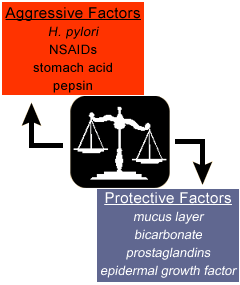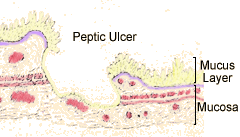|
The cause of peptic ulcer disease (PUD) may be best described as an imbalance between the body's aggressive and protective factors. Aggressive factors that can cause damage to the gastrointestinal (GI) tract include a bacteria called helicobacter pylori (h. pylori), non-steroidal anti-inflammatory drugs (NSAIDs) such as ibuprofen, stomach acid, and pepsin (a digestive enzyme).
 |
The factors that protect the lining of the GI tract from the effects of the aggressive factors include an intact mucus layer, bicarbonate from the pancreas as a buffering agent, prostaglandins, and a substance called epidermal growth factor that reduces acid secretion. H. pylori and NSAIDs are the most significant factors that have been linked to the development of PUD. H. pylori initiates a compromise in the lining of the stomach that allows acid and pepsin to enter the tissue and cause damage. NSAIDs inhibit prostaglandins, thus leading to a reduction in protective factors. Other risk factors associated with PUD include smoking, stress, diet and alcohol use.
 |
| The mucus layer protects the stomach or duodenal lining from acid erosion and is secreted by the cell-rich loose connective tissue (the mucosa) located underneath. With a peptic ulcer, the mucus layer is disrupted. |
|
| |
|
|
According to TCM, peptic ulcer can be caused by any of the following:
1. Dietary injury
Diet is an important cause of stomach disorders. The stomach receives and ripens food; the spleen transforms and transports refined nutrient essence up towards the lungs, whilst the stomach sends waste down towards the intestines. The descending function of the stomach corresponds with the ascending function of the spleen, and this is crucial in ripening, transporting and transforming nutrient essence and wastes in the middle burner. Improper eating habits affect the stomach easily which leads the stomach-qi to flow in the wrong direction, and results in nausea, vomiting, hiccups or belching.
2. Emotional distress
Emotional problems have a profound influence on stomach disorders. When emotions such as anxiety, pensiveness, grief and anger predominate, liver yang ascends and liver qi stagnates which, in turn, affects the functioning of the spleen and stomach. In the absence of the liver's regulatory function, the spleen cannot successfully transport and transform food into qi and blood, and the stomach cannot send waste down to the intestines. This causes epigastric pain, belching or nausea.
3. Weakness of spleen and stomach
This may be due to genetic constitutional weakness, or mental over-exertion over a long period. A person tends to get digestive problems like a poor appetite, vomiting or diarrhea, and possibly also muscle weakness and low energy. When attacks from pathogenic factors become more serious, stomach disorders occur easily.
|
| |
|